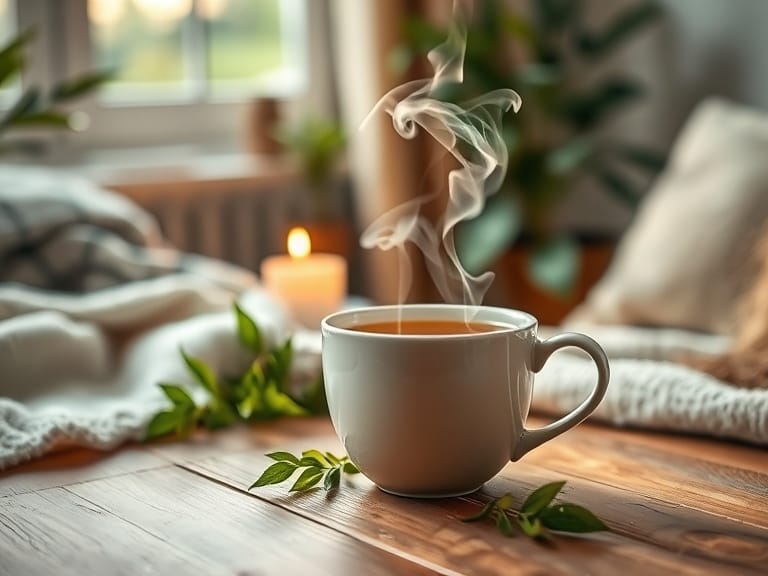
Life can feel like a pressure cooker set on high. Deadlines, family drama, traffic that makes you question humanity — anxiety sneaks up, sits heavy on your chest, and suddenly, you’re spiraling.
Herbal tea, that mystical potion hyped as nature’s Xanax. But does sipping on a steaming cup of chamomile or peppermint actually tame the beast of anxiety, or is it just one of those feel-good rituals we swear by because, well, it sounds wholesome?
Grab a cup (herbal or not) and let’s dive into the truth behind this age-old remedy.
The Science Behind the Sip
First off, let’s talk facts. Certain herbs used in teas — like chamomile, lavender, and valerian root — are backed by some legit science. For example, chamomile contains apigenin, an antioxidant that binds to receptors in your brain to potentially reduce stress and improve sleep.
Valerian root? It’s been touted as a natural sedative, with compounds that might regulate brain activity and calm the chaos.
But here’s the tea (pun fully intended): While studies hint at calming effects, herbal tea isn’t a magic wand. You’re not going to banish existential dread with one cozy cup. At best, it’s part of a bigger toolkit for managing anxiety. Think yoga, therapy, or blasting your favorite sad songs in the car — whatever floats your boat.
Why We Keep Coming Back to That Mug?
Here’s where things get interesting. Science aside, drinking herbal tea isn’t just about the herbs. It’s the whole vibe. The ritual of boiling water, inhaling the aroma, cradling a warm mug — it’s like a mini timeout from life’s chaos.
For a moment, you’re grounded. Your phone is (hopefully) set aside, and you’re simply being. There’s something therapeutic about this ritual, even if the tea itself isn’t laced with miracle compounds. It’s not so much about what’s in the cup but what that cup represents: a pause.
Plus, let’s not ignore the placebo effect. If you believe your lavender brew is the elixir of calm, your brain might just play along. It’s not fakery; it’s your mind stepping in to help out when science can’t quite seal the deal.
But Does It Really Work?
What soothes your restless soul might barely make a dent in someone else’s stress. Your friend swears by peppermint tea, while you find it about as effective as drinking hot water. And that’s okay.
Some folks with chronic anxiety might find herbal tea helpful as part of a broader self-care routine, but it’s not a replacement for professional help. If your anxiety feels like it’s running the show, it’s time to call in the experts — therapists, counselors, or even your doctor. Herbal tea can be a sidekick, but it’s not the hero.
A Cup of Comfort, No Strings Attached
Let’s get real for a second. The world is heavy, and finding solace can feel like searching for a needle in a haystack. If sipping on a floral, slightly bitter concoction brings even a sliver of peace, why not lean into it?
And honestly, herbal tea isn’t about perfection. Some days, it’s a steaming cup of serenity; other days, it’s lukewarm water you forgot on the counter because your kid spilled cereal, the dog barked at a ghost, and your inbox exploded. Life happens.
Tips for Turning Tea Time into Me Time
If you’re ready to dip your toes (or your tea bag) into the herbal world, here’s how to level up your experience:
- Experiment: Don’t marry the first flavor you try. Chamomile, peppermint, rooibos — find what works for you.
- Set the Scene: Light a candle, play soft music, or just sit in blessed silence. Let the ritual be as calming as the tea itself.
- Sip Slowly: No chugging. Savor it like the fancy adult you are.
- Mix and Match: Feeling fancy? Try blending teas. Peppermint and lavender are a dreamy duo.
So Whats The Verdict?
Does herbal tea actually calm anxiety? The short answer: kind of. The longer answer: It’s less about the tea and more about the space it creates in your chaotic day. That’s the real magic.
So the next time life throws you a curveball, reach for a mug. Even if it doesn’t fix everything, it might just be the pause you didn’t know you needed. And worst-case scenario? You’ve had a damn good cup of tea.
Now, how about a refill?









